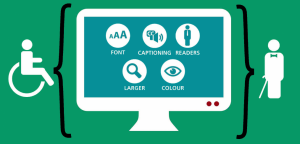Earlier this year Tampa’s Channel 8 News (WFLA) reported on the growing trend of lawsuits being brought against business owners with websites that are not Americans with Disabilities Act (ADA) accessible. Plaintiffs’ counsel have developed a cottage industry of sorts by filing thousands of lawsuits alleging that company websites are not accessible to the blind or visually impaired, in violation of Title III of the ADA, which prohibits discrimination on the basis of disability in “places of public accommodation.” 42 U.S.C. §12182(a). While ADA lawsuits previously focused on physical access barriers to businesses, these new lawsuits allege that: (1) private company websites qualify as places of public accommodation; and, (2) websites with access barriers (e.g., websites without compatible screen-reading software) deny plaintiffs the right of equal access. About 5,000 such lawsuits were filed in federal court for alleged website violations in the first 6 months of 2018 and the number of lawsuits was projected at about 10,000 by the end of 2018. ADA lawsuits over websites have targeted retailers (including Winn-Dixie), restaurants (including Domino’s Pizza, universities (including Harvard and MIT) and healthcare providers (including CVS).
These litigants have now moved on to suing small business and Community Associations in Federal Court for alleged ADA and FHA violations on their websites. The law firms filing these suits often find a single disabled person and then file hundreds of lawsuits supposedly on that person’s behalf. Those filing the lawsuits typically seek tens of thousands of dollars for the settlement of their claims. Many Florida Community Associations have already been served with lawsuits. These litigants claim the ADA applies to Community Associations through the Florida Fair Housing Act and the Federal Fair Housing Act (FHA). They allege that a disabled person was unable to navigate the association’s website and then demand money.
Unfortunately for businesses and community associations there is a split in the Courts as to the requirements for websites to be found compliant with the ADA. As of 2019 we are recommending that our Community Association clients contact a web developer to ensure their websites have a least a minimal level of compliance (screen-reader compatibility) with the ADA and FHA.
For information and pricing on achieving website compliance community associations can contact web development company “thirteen05 creative” in Tampa at (813) 251-0043 which has substantial experience in assessing and upgrading websites for ADA compliance.

